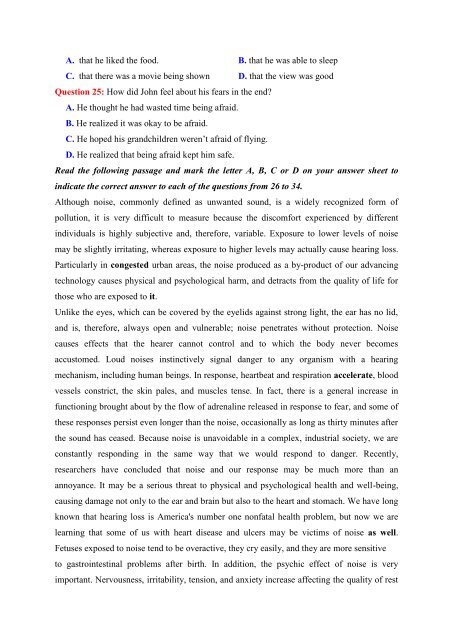Bộ đề thi thử THPTQG năm 2018 - Môn Tiếng Anh - 11 ĐỀ + ĐÁP ÁN - GV Nguyễn Phương - Hoc24h
https://app.box.com/s/94z9bdswkqqzgjyiz0qq8wl2qtk4nygj
https://app.box.com/s/94z9bdswkqqzgjyiz0qq8wl2qtk4nygj
You also want an ePaper? Increase the reach of your titles
YUMPU automatically turns print PDFs into web optimized ePapers that Google loves.
A. that he liked the food. B. that he was able to sleep<br />
C. that there was a movie being shown D. that the view was good<br />
Question 25: How did John feel about his fears in the end?<br />
A. He thought he had wasted time being afraid.<br />
B. He realized it was okay to be afraid.<br />
C. He hoped his grandchildren weren’t afraid of flying.<br />
D. He realized that being afraid kept him safe.<br />
Read the following passage and mark the letter A, B, C or D on your answer sheet to<br />
indicate the correct answer to each of the questions from 26 to 34.<br />
Although noise, commonly defined as unwanted sound, is a widely recognized form of<br />
pollution, it is very difficult to measure because the discomfort experienced by different<br />
individuals is highly subjective and, therefore, variable. Exposure to lower levels of noise<br />
may be slightly irritating, whereas exposure to higher levels may actually cause hearing loss.<br />
Particularly in congested urban areas, the noise produced as a by-product of our advancing<br />
technology causes physical and psychological harm, and detracts from the quality of life for<br />
those who are exposed to it.<br />
Unlike the eyes, which can be covered by the eyelids against strong light, the ear has no lid,<br />
and is, therefore, always open and vulnerable; noise penetrates without protection. Noise<br />
causes effects that the hearer cannot control and to which the body never becomes<br />
accustomed. Loud noises instinctively signal danger to any organism with a hearing<br />
mechanism, including human beings. In response, heartbeat and respiration accelerate, blood<br />
vessels constrict, the skin pales, and muscles tense. In fact, there is a general increase in<br />
functioning brought about by the flow of adrenaline released in response to fear, and some of<br />
these responses persist even longer than the noise, occasionally as long as <strong>thi</strong>rty minutes after<br />
the sound has ceased. Because noise is unavoidable in a complex, industrial society, we are<br />
constantly responding in the same way that we would respond to danger. Recently,<br />
researchers have concluded that noise and our response may be much more than an<br />
annoyance. It may be a serious threat to physical and psychological health and well-being,<br />
causing damage not only to the ear and brain but also to the heart and stomach. We have long<br />
known that hearing loss is America's number one nonfatal health problem, but now we are<br />
learning that some of us with heart disease and ulcers may be victims of noise as well.<br />
Fetuses exposed to noise tend to be overactive, they cry easily, and they are more sensitive<br />
to gastrointestinal problems after birth. In addition, the psychic effect of noise is very<br />
important. Nervousness, irritability, tension, and anxiety increase affecting the quality of rest


















